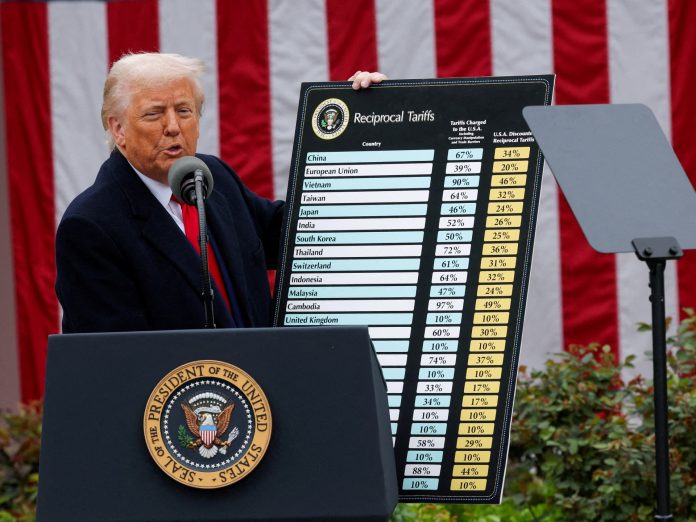The tariffs have been widely criticised around the world for threatening to push the global economy into a recession.
More than 50 countries have directly contacted the White House to initiate trade talks following US President Donald Trump’s imposition of wide-ranging punitive tariffs, administration officials have said.
The tariffs, which caused a nearly $6 trillion drop in US stock values last week and battered global markets, have drawn worldwide attention and sparked fears of a potential economic downturn. But the Trump administration has downplayed that and potential further catastrophic economic fallout.
In the meantime, investors nervously awaited the open of US trading after Wall Street’s selloff last week, anticipating another week of turbulence as other nations react. Asian markets will open in the coming hours and expect a rocky day.
In a series of Sunday-morning talk show interviews, Trump’s top economic advisers defended the tariffs, describing them as a strategic move to strengthen the US position in global trade.
Treasury Secretary Scott Bessent revealed that more than 50 nations had begun negotiations with the US since the tariffs were announced on Wednesday, but did not disclose the countries involved.
Bessent claimed the tariffs gave Trump “maximum leverage,” though their impact on the US economy remains uncertain. He dismissed concerns about a recession, citing unexpectedly strong job growth in the US.
Trump’s wide-ranging tariffs came into effect on Saturday.
The initial 10 percent “baseline” tariff took effect at US seaports, airports and customs warehouses, ushering in Trump’s full rejection of the post-World War II system of mutually agreed tariff rates.
A decline in US GDP
Despite this, economists have warned that the tariffs could lead to a decline in US gross domestic product (GDP), with JPMorgan economists revising their growth forecast from a 1.3 percent increase to a 0.3 percent decrease.
The tariffs, aimed at pressuring foreign governments to make concessions, have also triggered retaliatory levies, including hefty ones from China, raising fears of a global trade war.
US allies like Taiwan, Israel, India, and Italy have already expressed interest in negotiating with the US to avoid the tariffs.
Taiwanese leader Lai Ching-te offered zero tariffs as the basis for talks, while Israeli Prime Minister Benjamin Netanyahu sought relief from the 17 percent tariff on Israeli goods.
Meanwhile, the US continues to implement tariffs, with higher “reciprocal” duties expected to take effect on Wednesday.
Critics have raised concerns over the method used to determine the tariffs, especially after they were applied to some remote, uninhabited territories.
Commerce Secretary Howard Lutnick defended the strategy, claiming that it aimed to prevent countries from circumventing the tariffs with loopholes.




